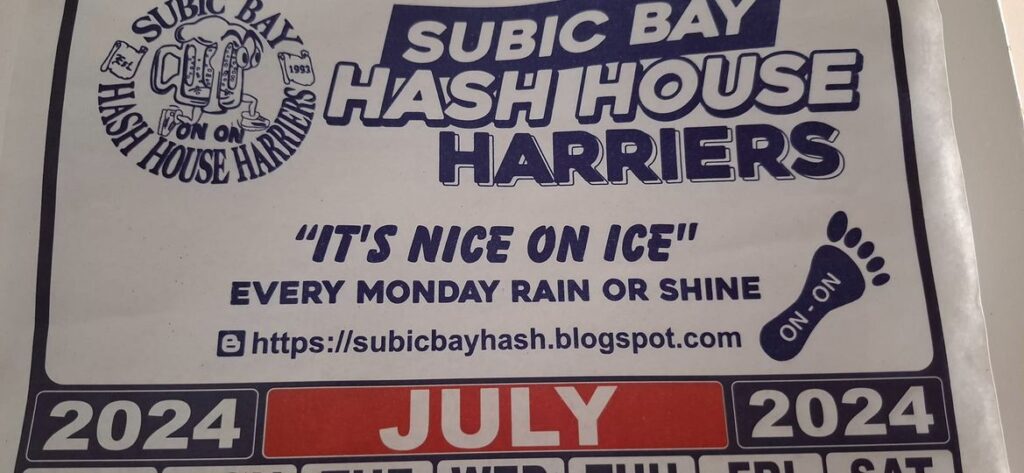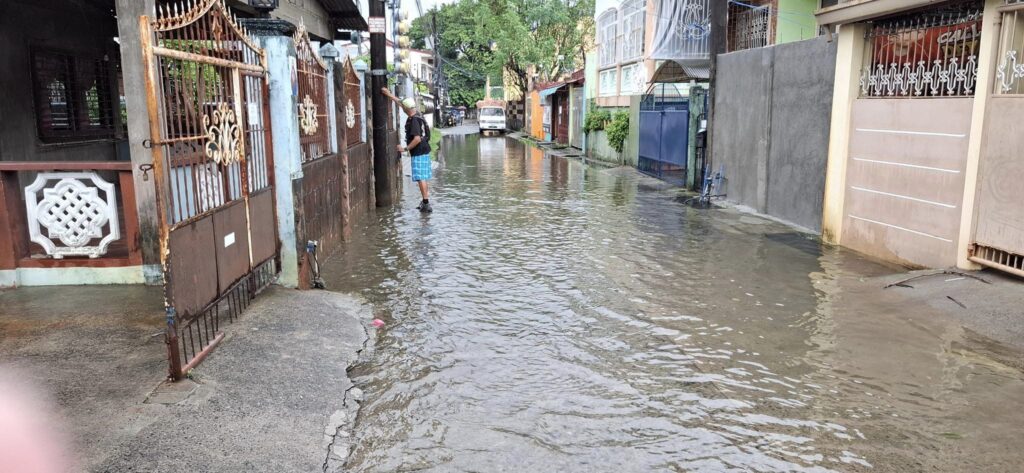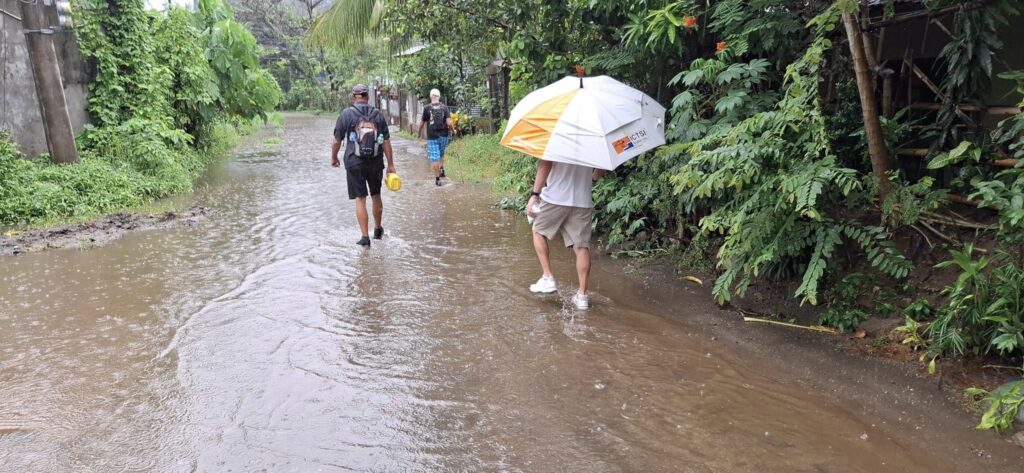
No surprise that the weather was wet for yesterday’s Hash. And our Hash calendar dictates that we are “On-On” every Monday rain or shine. Yesterday was no exception to that rule. So, us Hares headed out to mark a rainy day trail at 11 a.m. We had two climbs. The first was mostly steps and paved. The second was up a dirt trail. I opted not to take that route; instead, I marked a street trail back to the On-Home venue at the One Three Resort. Both versions were just shy of five kilometers.
The rain varied in intensity throughout the day. I used shredded paper to mark the path and tried to find places to drop it where it wouldn’t wash away. Feedback from the Hashers was positive—the trail was easy to follow and a good one for a rainy day. That’s what this Hare wants to hear. I asked around and didn’t find anyone who said they had done the easy version I marked, but at least there was that option. Mission accomplished!














And that’s what our rainy day Hash looked like. We finished marking the trail just before one. The Hashers gathered at the starting location at two. The other Hares went to send them off, but I elected to just stay at the One Three Resort and wait for the group to arrive. The first of the runners appeared around three. So, I had a couple of extra hours to spend drinking beers. By the end of the Hash festivities, I was soaked in more ways than one. Coincidentally, Swan was visiting relatives a couple of doors away from the resort, and she joined me while I waited for the Hash to begin. Then, she returned afterward, and we rode home together in a trike—a nice finish to the day.
It rained all night and is still raining today. ‘Tis the season and all that. I’m still not longing for those scorching days of heat, but it is early yet. I might feel different come September.
In today’s YouTube video, Reekay offers three mistakes that will alienate you from the expat community. I don’t believe I’m guilty of any of them, and really, they don’t seem all that common or bothersome. I mean, it is pretty natural to be asked, “Where do you live?” I just give a generic “Alta Vista” response, and that’s no big deal. No one has ever tried to find me or just drop by without an invite. I’ve never dated anyone’s recent ex, and no one has dated one of mine that I know of. Again, I’m not sure why I should care. The borrowing money thing is situational. I think the expat community needs to stick together and help one another out in an emergency. But there’s a difference between asking for a medical treatment or paying a bar tab. Like I said, none of these have been a real issue during my six years as an expat in the PI.
The jokes are on me:



Come on back tomorrow!

Our trail looked like this from heaven. The black line is the easy version.
Good luck finding the black line. I did find it eventually, but it took some looking. Maybe hunter’s orange next time…?
These all have the same error:
1. a rainy day trail
2. Hares have a come to Jesus moment
3. A rainy day vista
4. our rainy day Hash
With phrasal adjectives, hyphenate them if they precede the noun they modify. A “citizen who pays taxes” is a “tax-paying citizen.”
– a six-foot-tall man
– a long-lost love
– her come-hither stare
– my tripping-balls experience
Exception: if the first word of the phrasal adjective is an adverb ending in “-ly,” then don’t hyphenate.
WRONG: a rapidly-changing situation
RIGHT: a rapidly changing situation
Note that hyphenation links two words together if they belong together as a concept. Hyphenation also adds clarity:
VAGUE: a violent weather seminar (was there a fight?)
CLEAR: a violent-weather seminar
The “fuck” chart: useful in an ESL/EFL class. Then go over what part of speech each “fuck” is. That’ll get your students to stop enjoying the chart for sure!
Congrats on a well-Hared Hash.
And there’s this:
“I watched this boat taking on water during the heavy rains and wondered if it would flounder.”
I think you meant “founder,” not “flounder.”
— Flounder is a relatively common verb that current evidence dates to the late 16th century, when it was likely born by means of an alteration of an older verb, founder. The two have been confused ever since. Today, founder is most often used as a synonym of fail, or, in the case of a waterborne vessel, as a word meaning “to fill with water and sink.” Formerly, it was also frequently applied when a horse stumbled badly and was unable to keep walking. It’s likely this sense of founder led to the original and now-obsolete meaning of flounder: “to stumble.” In modern use, flounder typically means “to struggle” or “to act clumsily”; the word lacks the finality of founder, which usually denotes complete collapse or failure, as that of a sunken ship.—
https://www.merriam-webster.com/dictionary/flounder
Arrrrgh, matey.
Carry on.
Oh my, Drain. I’d totally missed that. And yes, I know the difference between founder and flounder. There is something fishy about flounder for sure. Is it too late for me to through my hat into the ring for President? I’m obviously qualified…
Kev, Man, I must have been de-hyphen-ated for some reason yesterday. I’m just getting sloppier and sloppier in my old-age ramblings. I’ll try and do better.
I imagine using that “fuck” chart would get most teachers fired. Or maybe they wouldn’t give a shit.
Cheers!